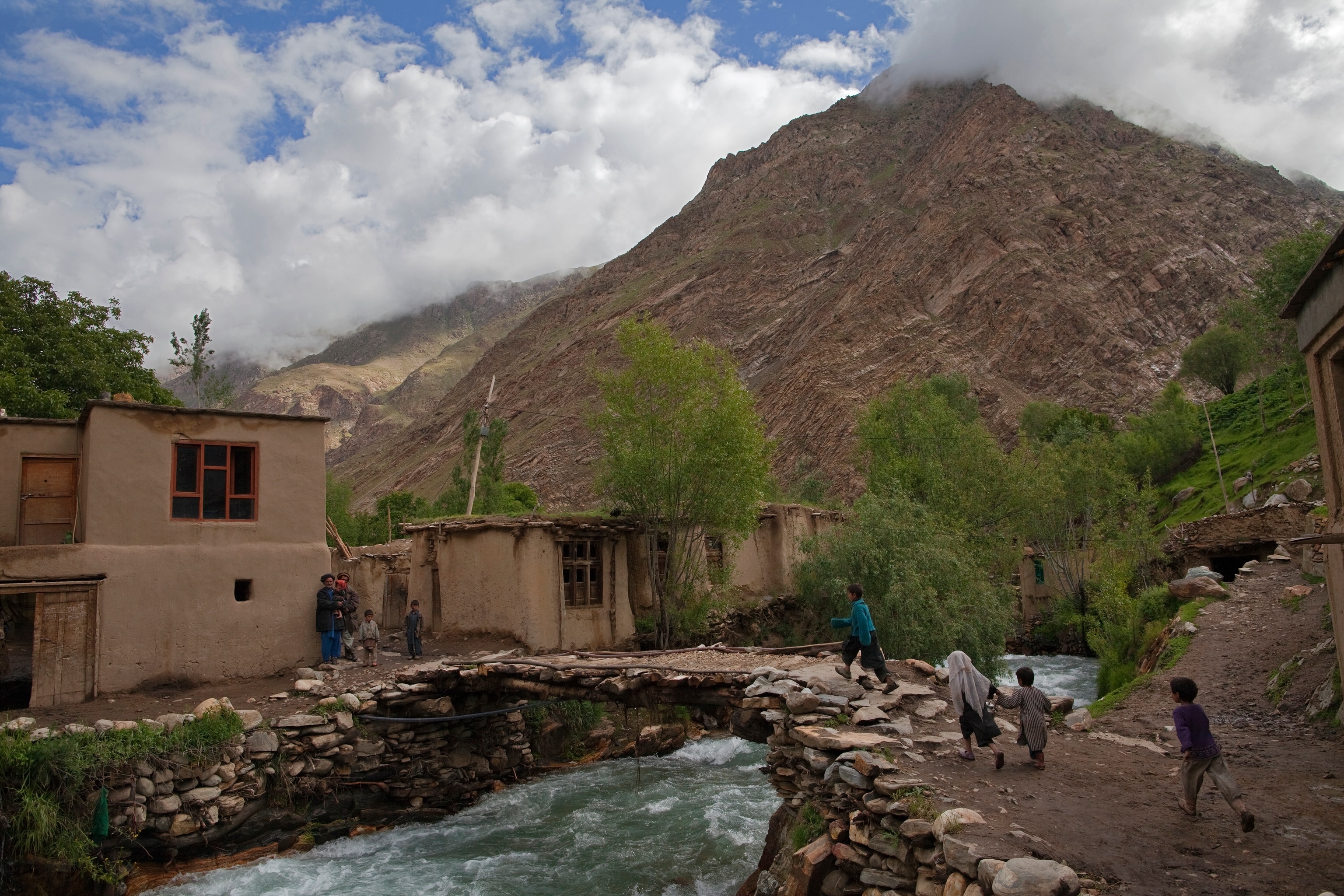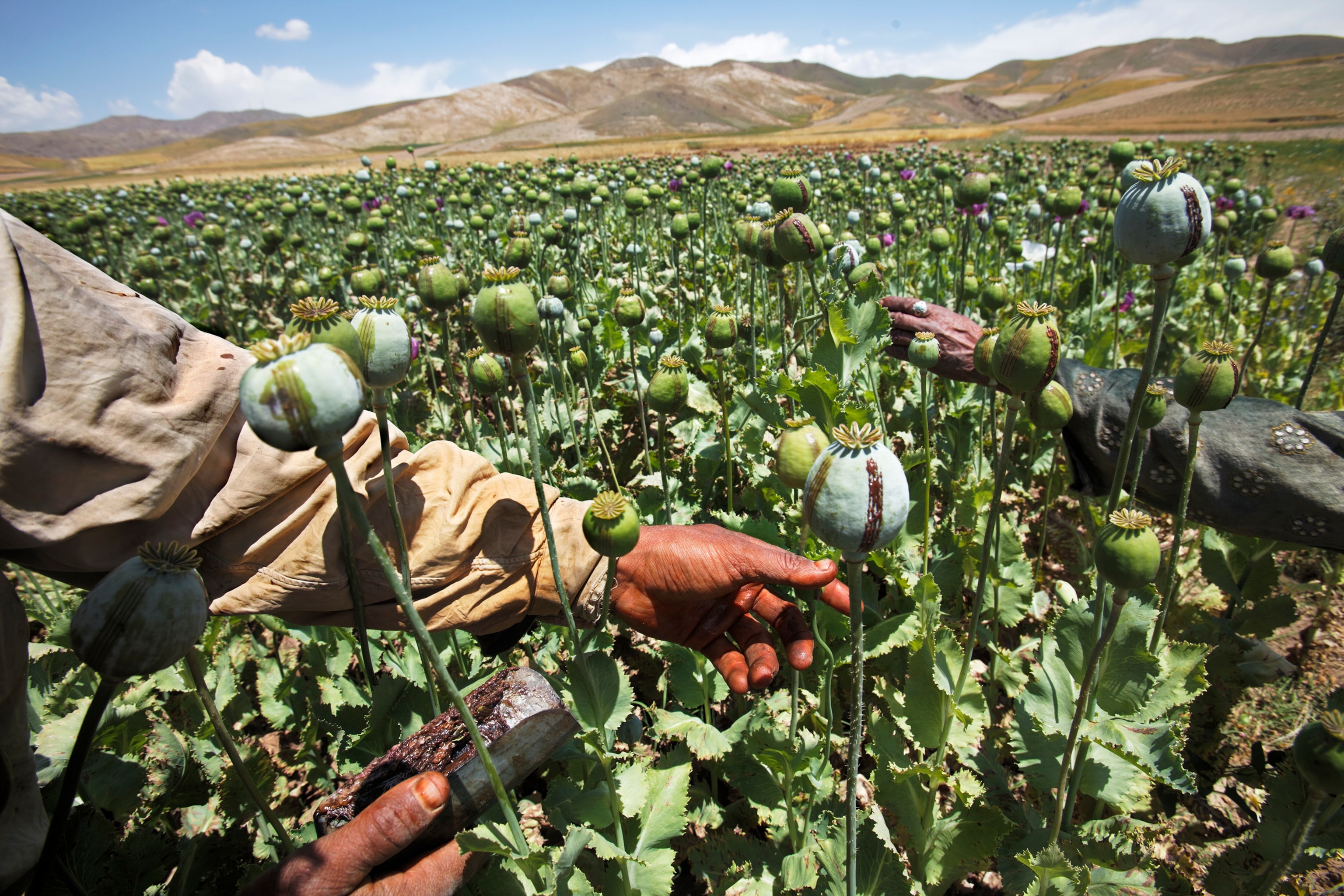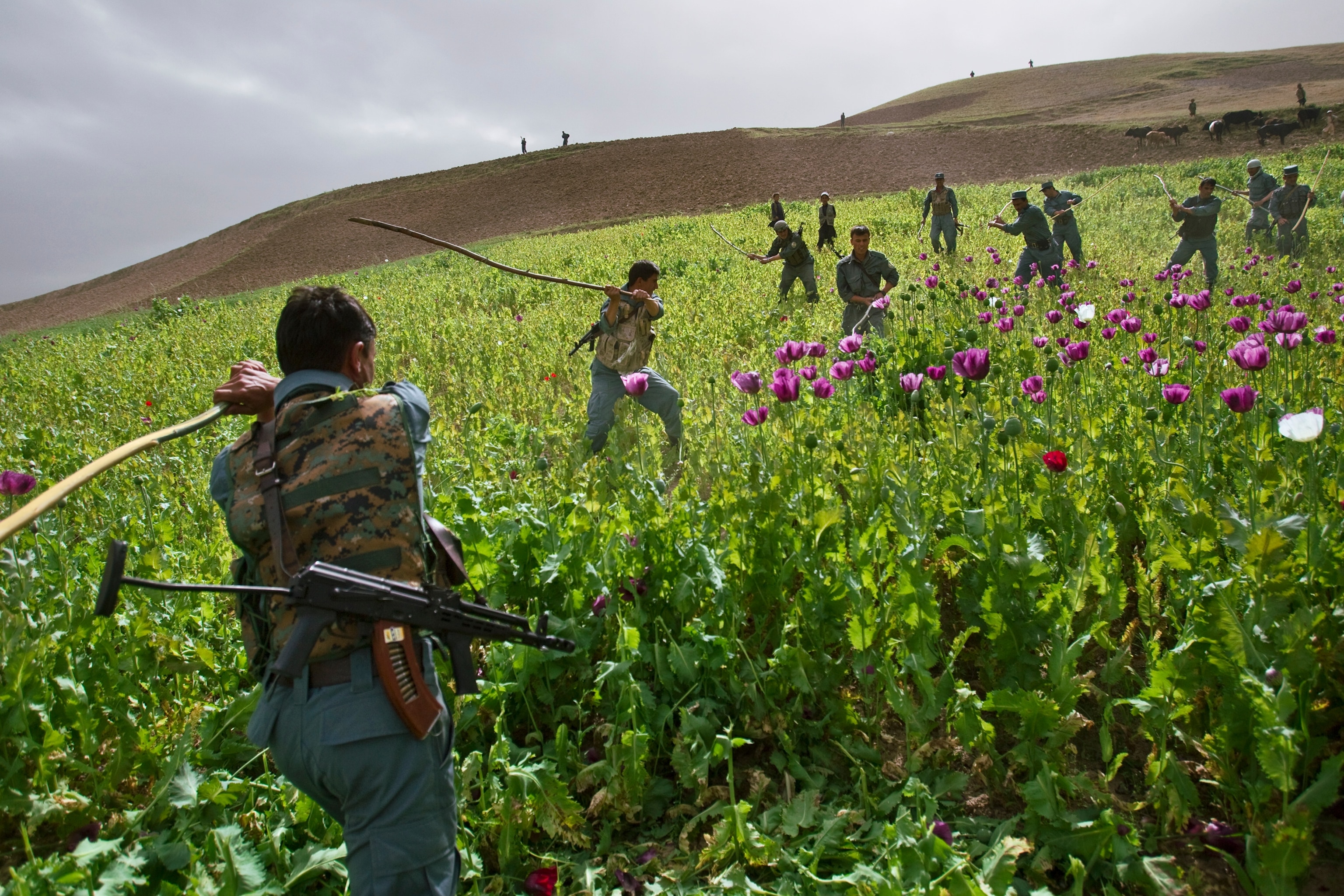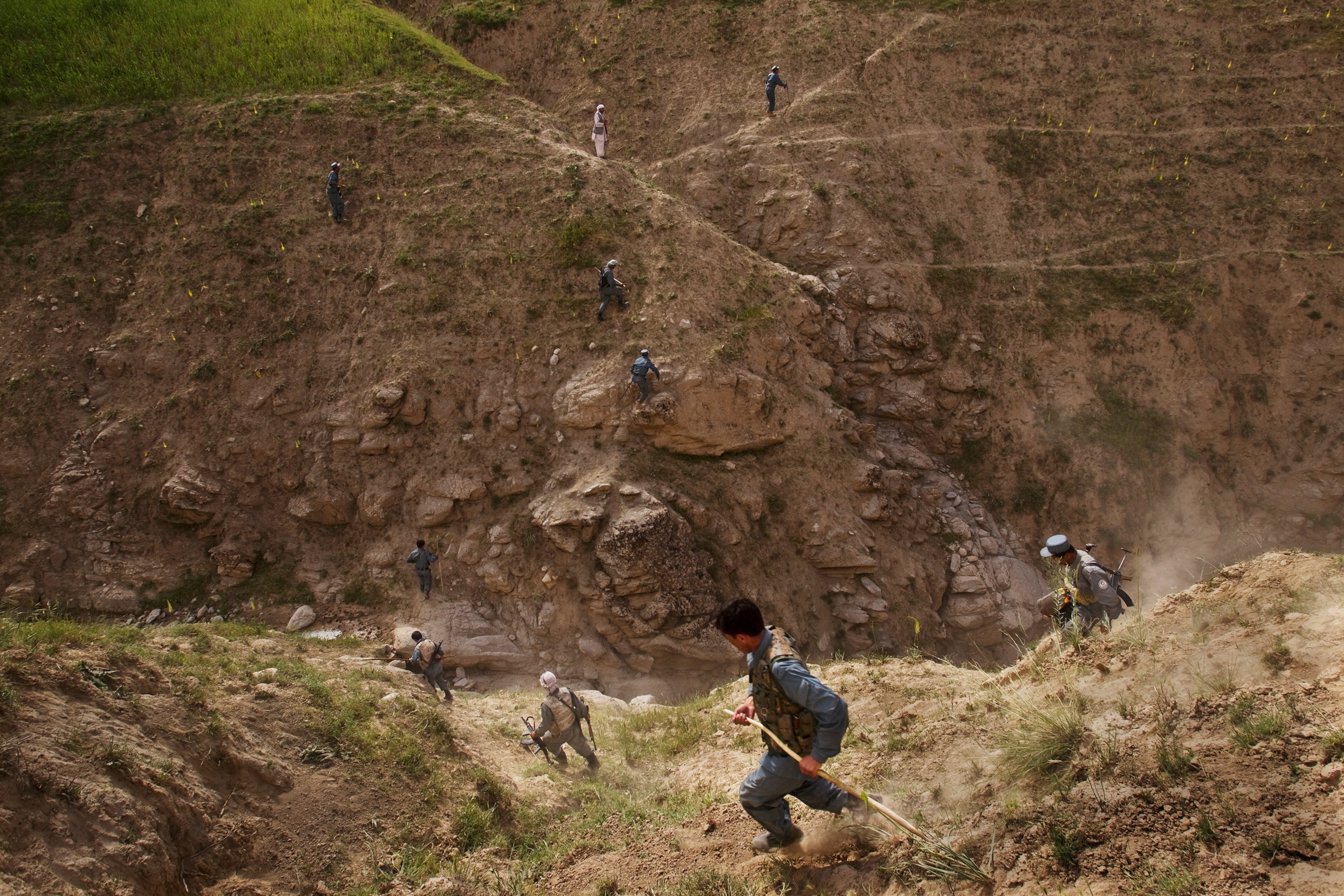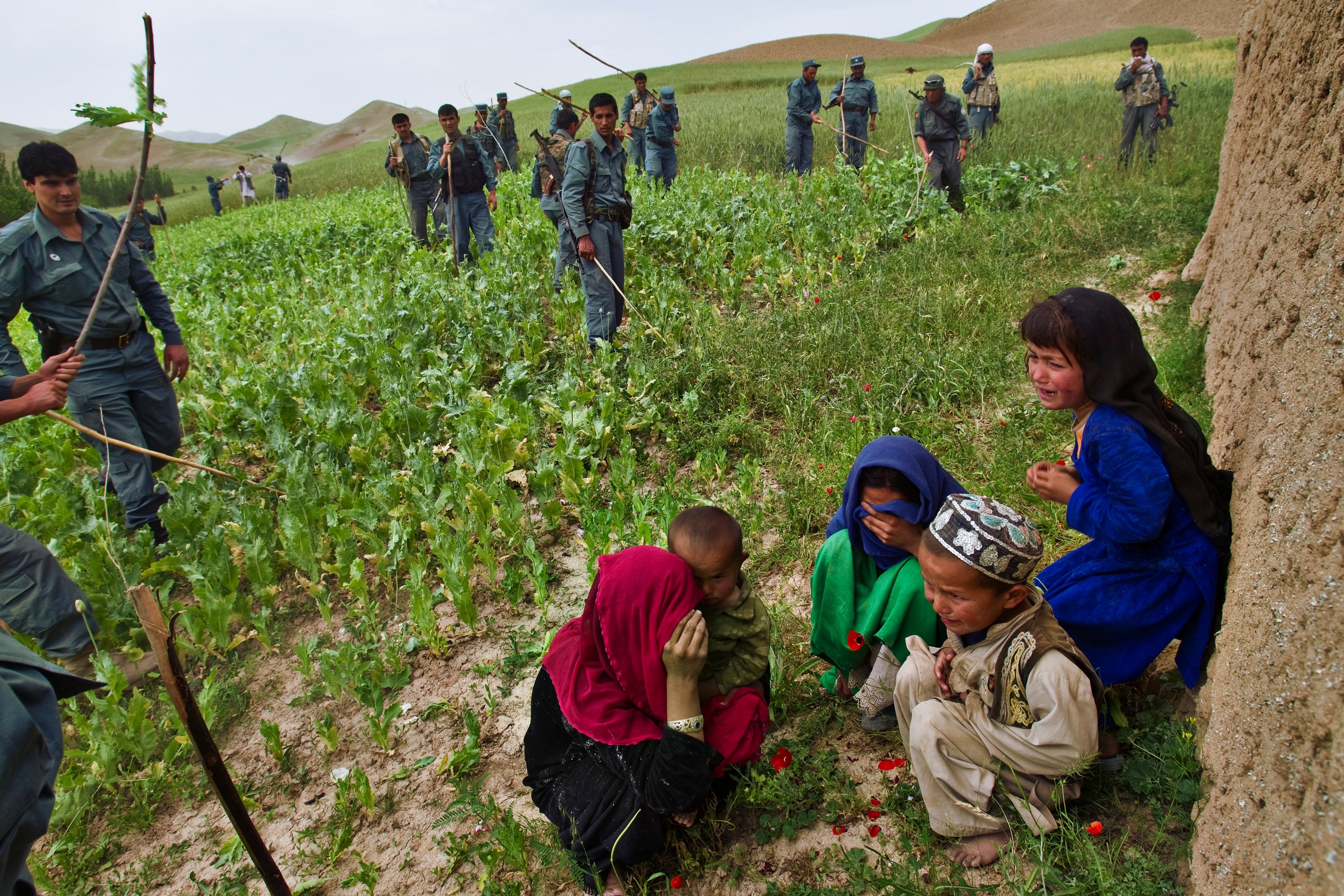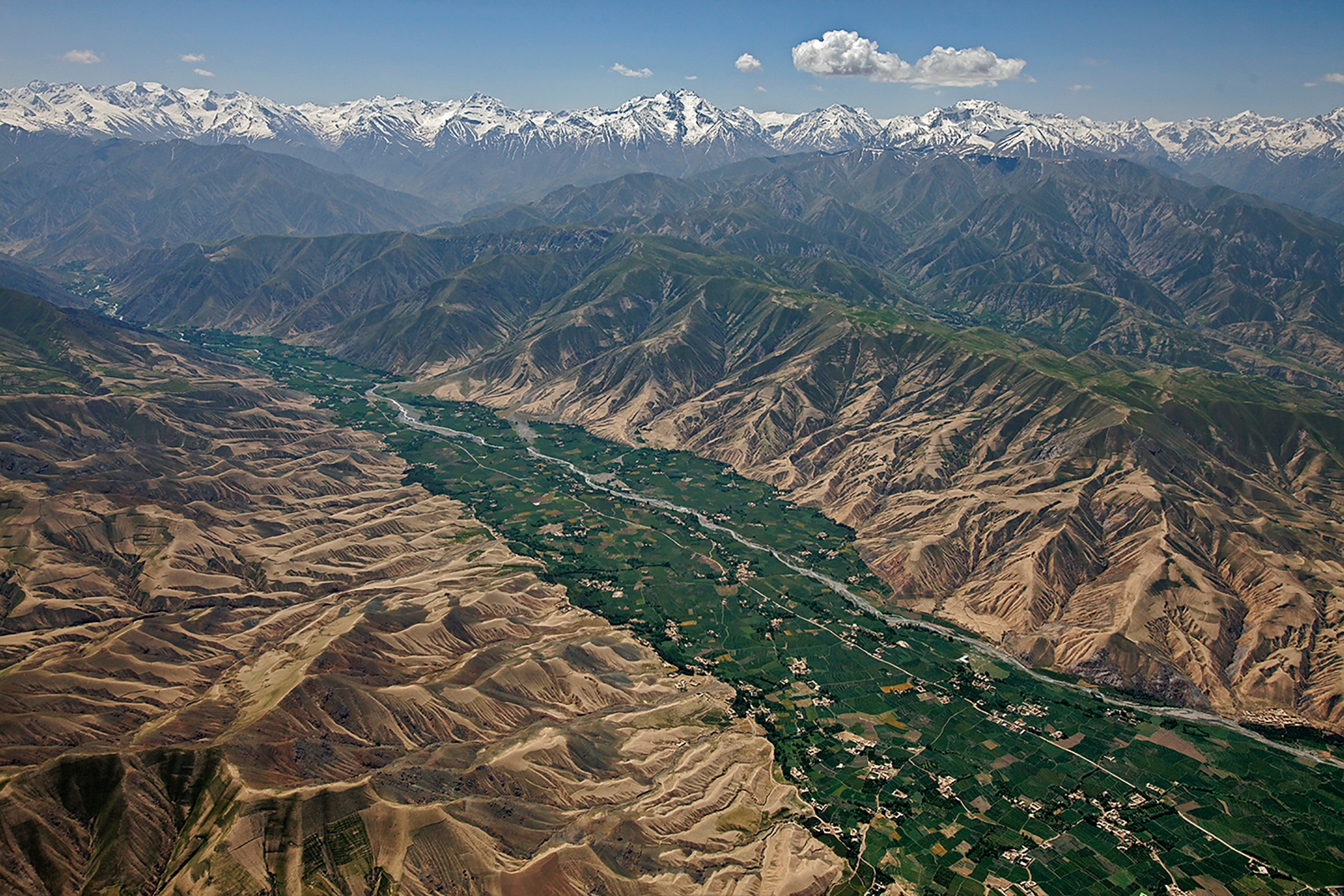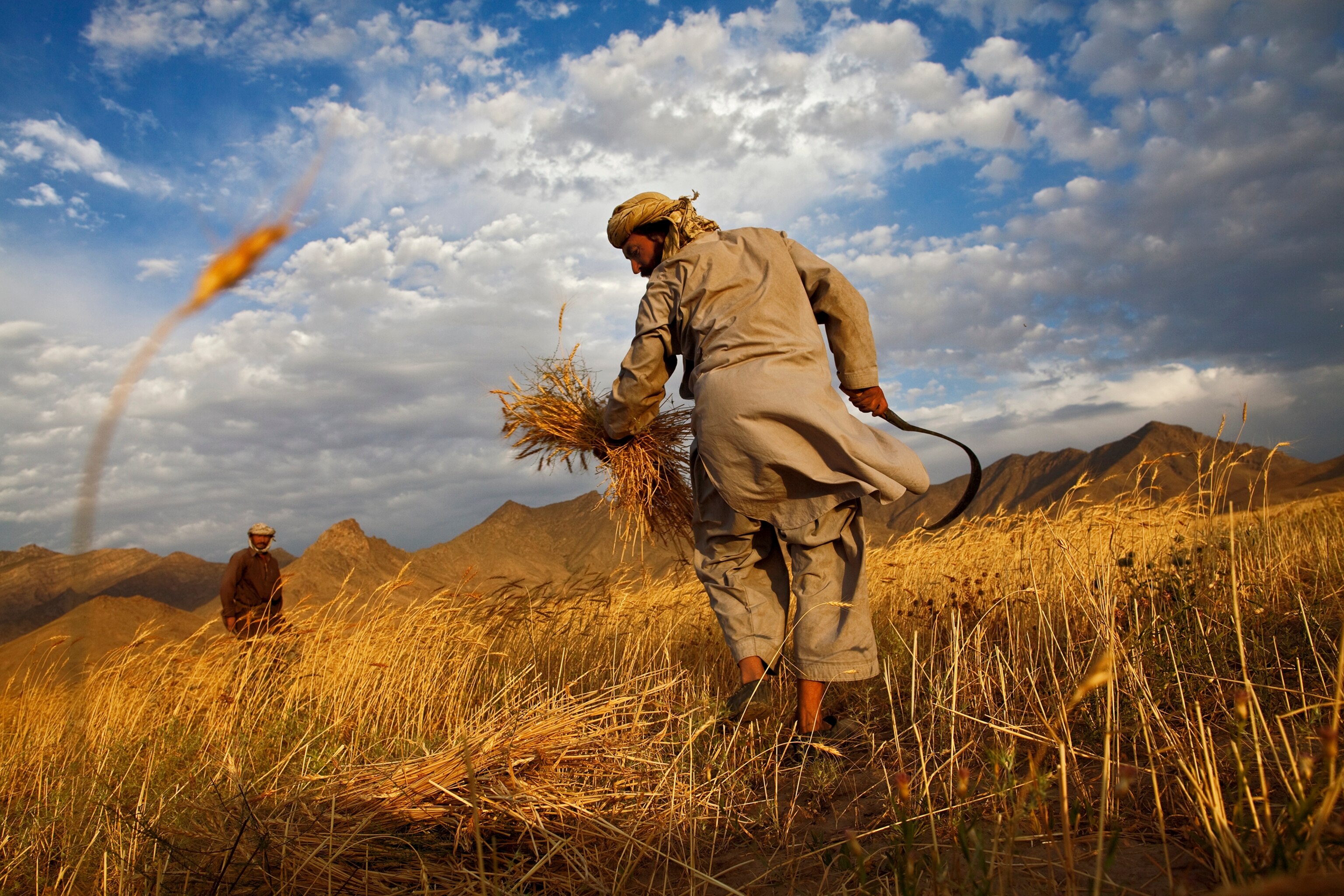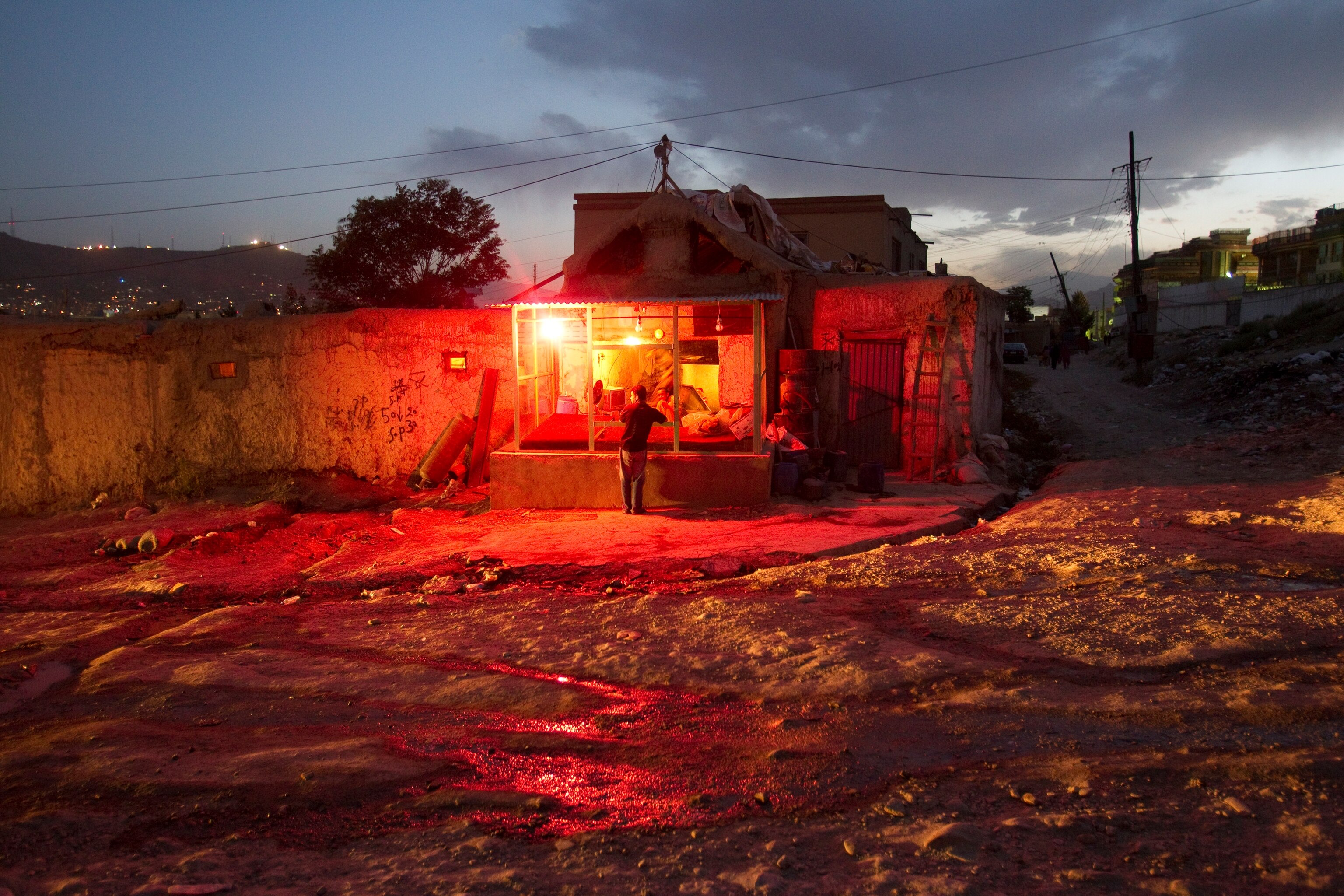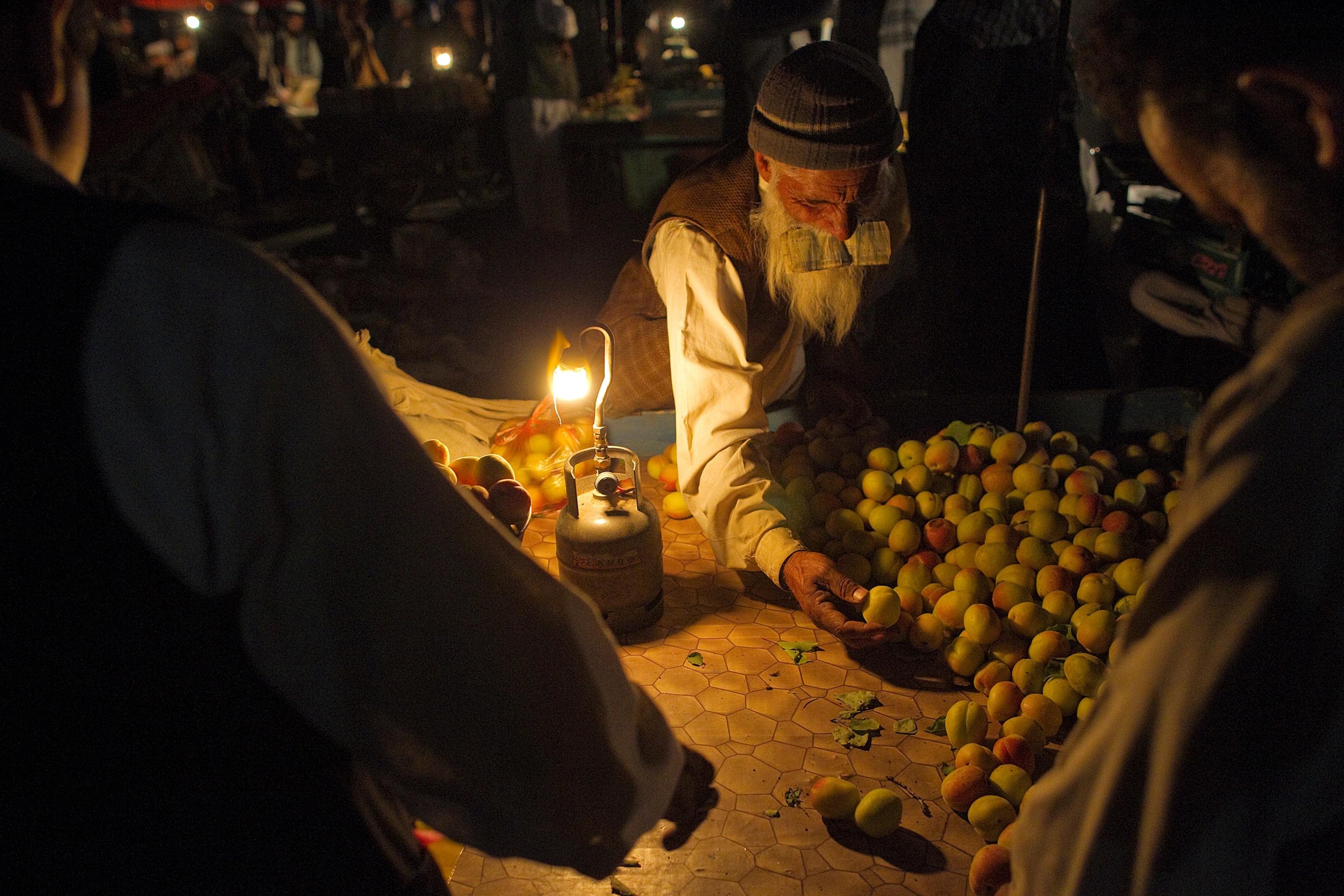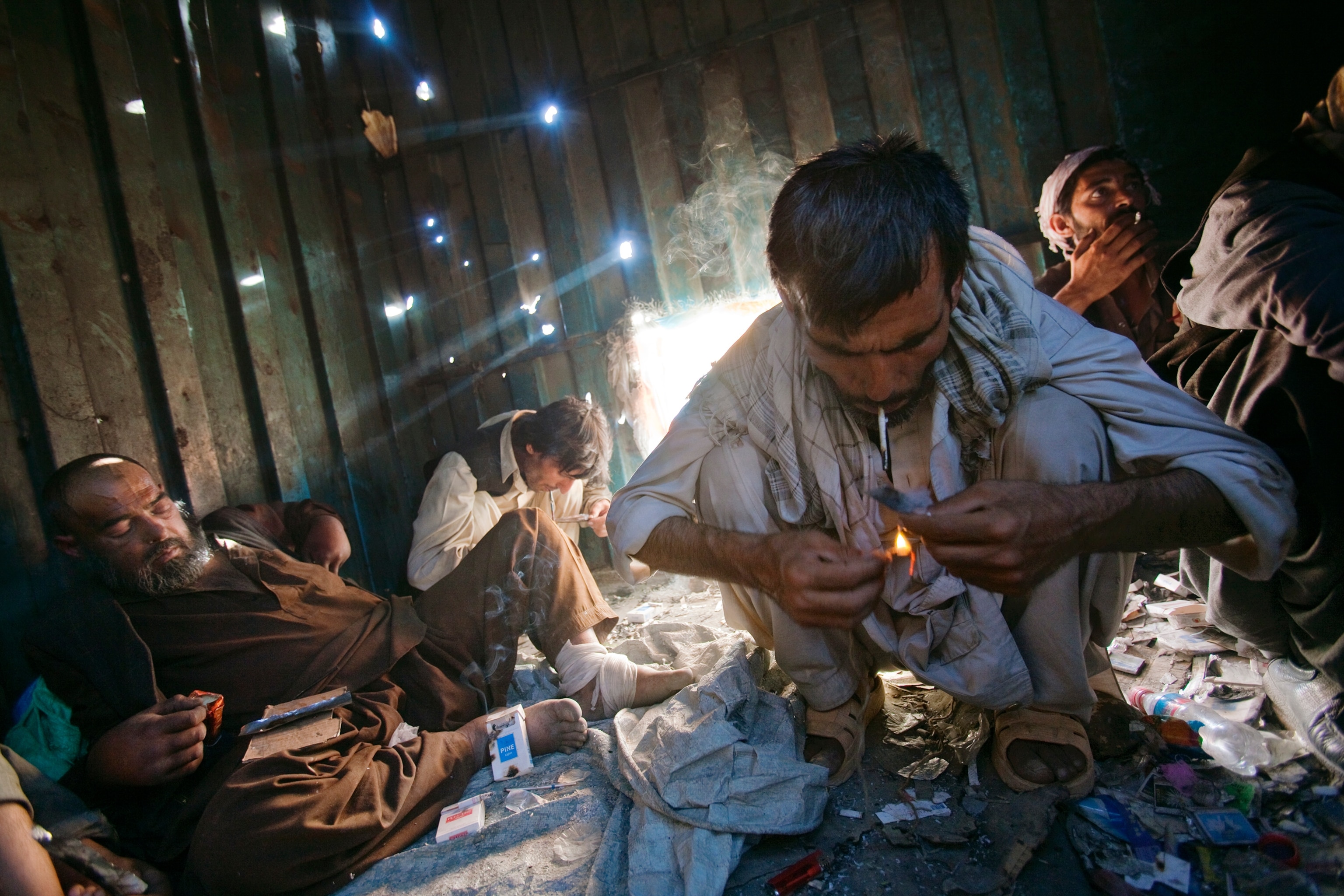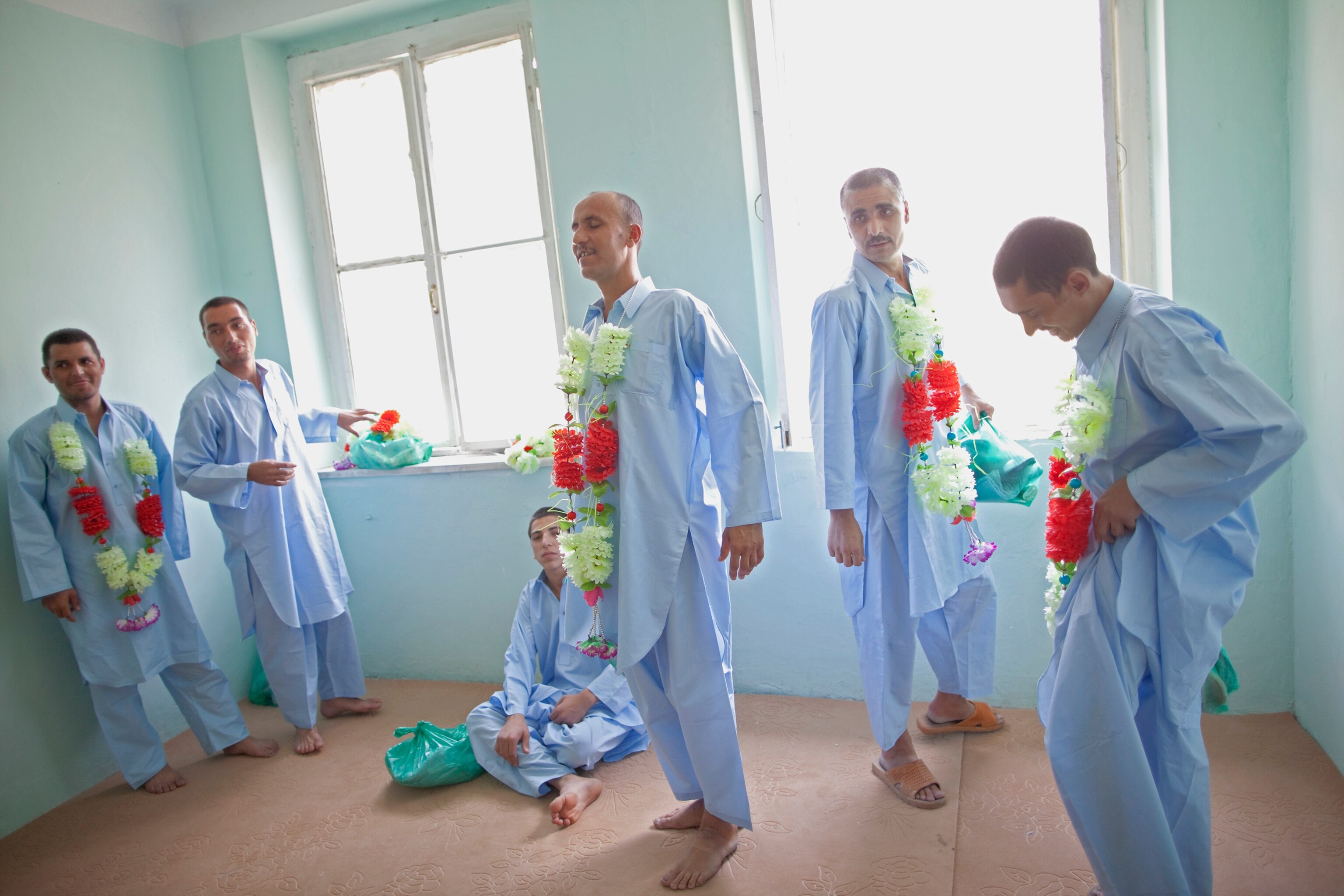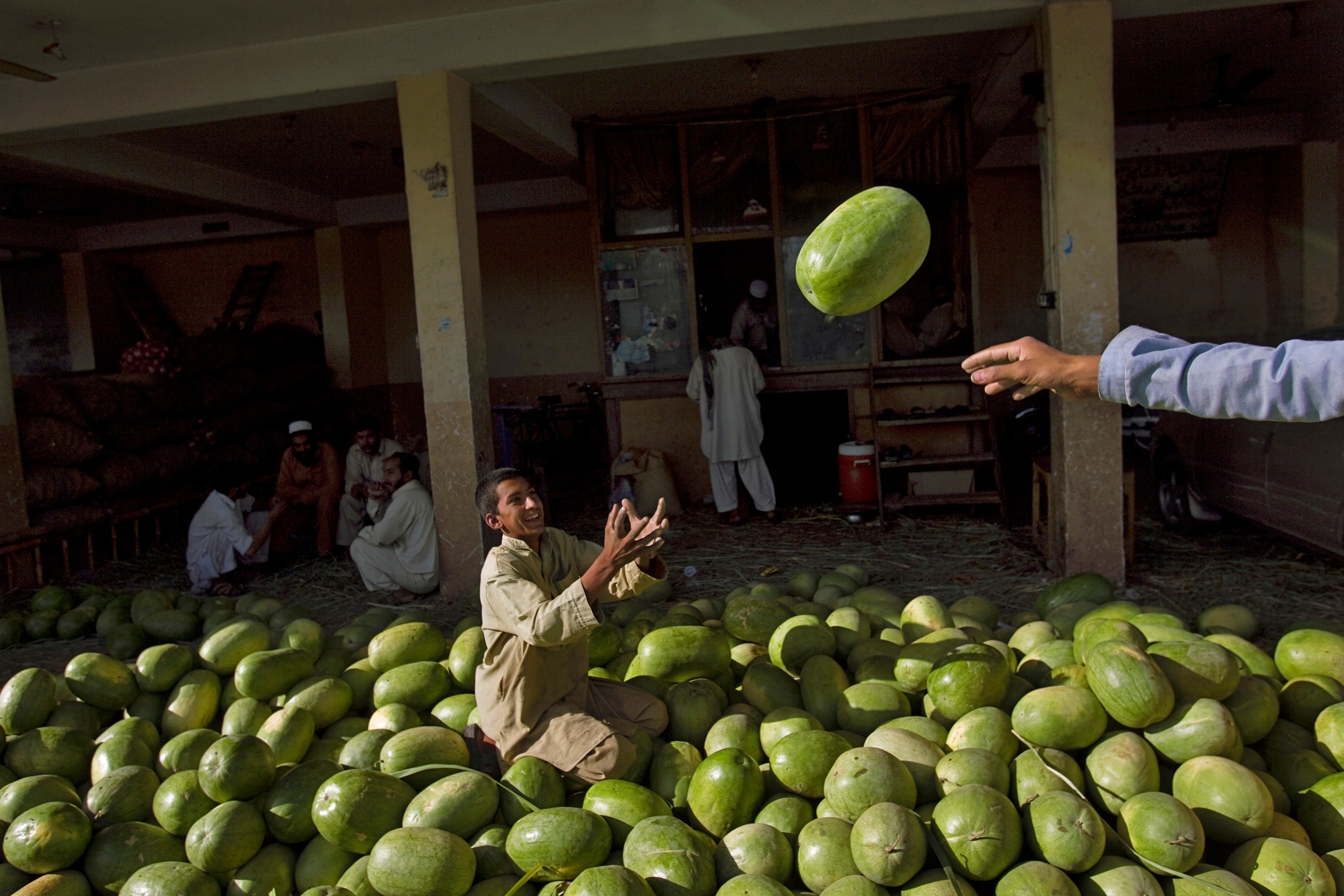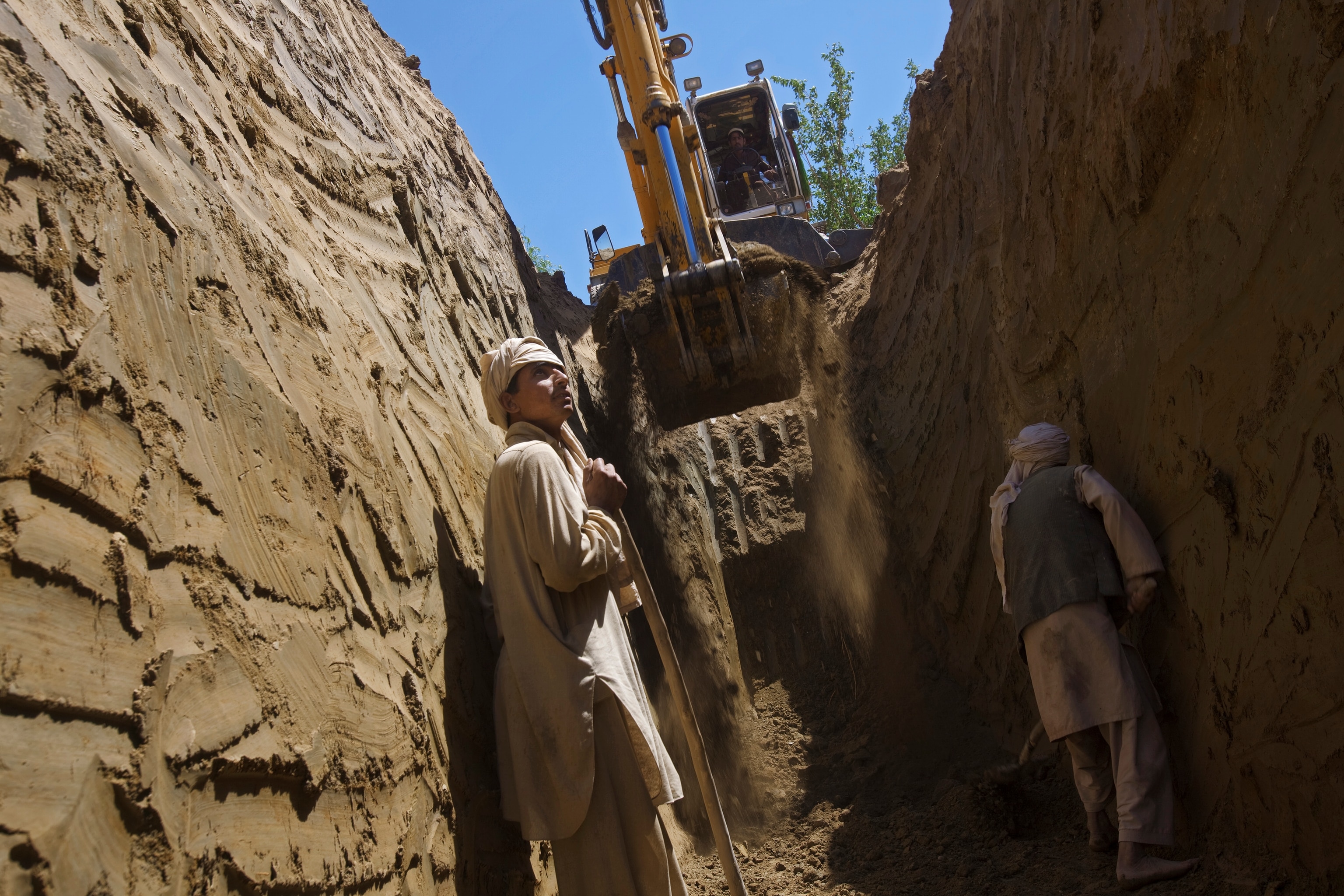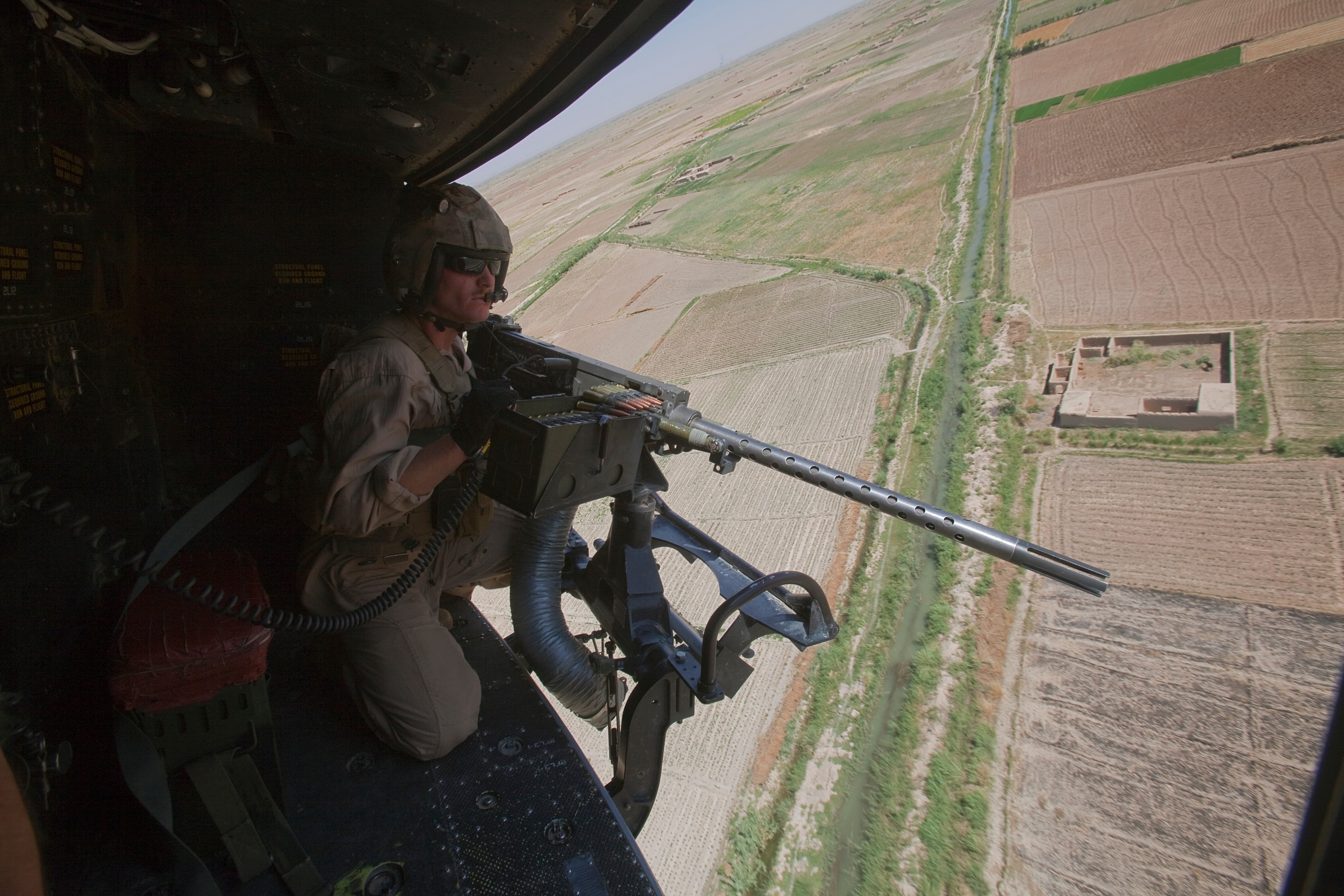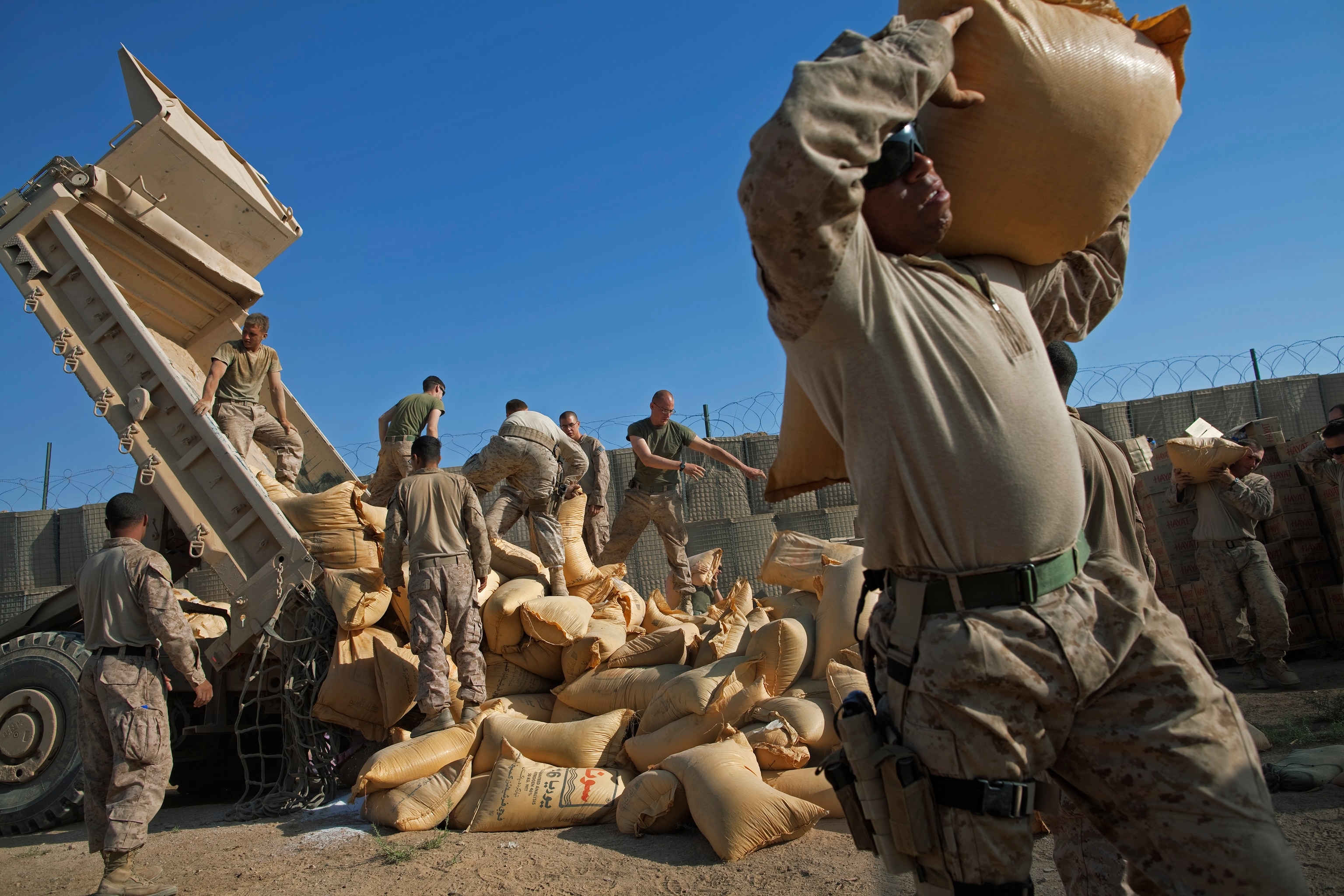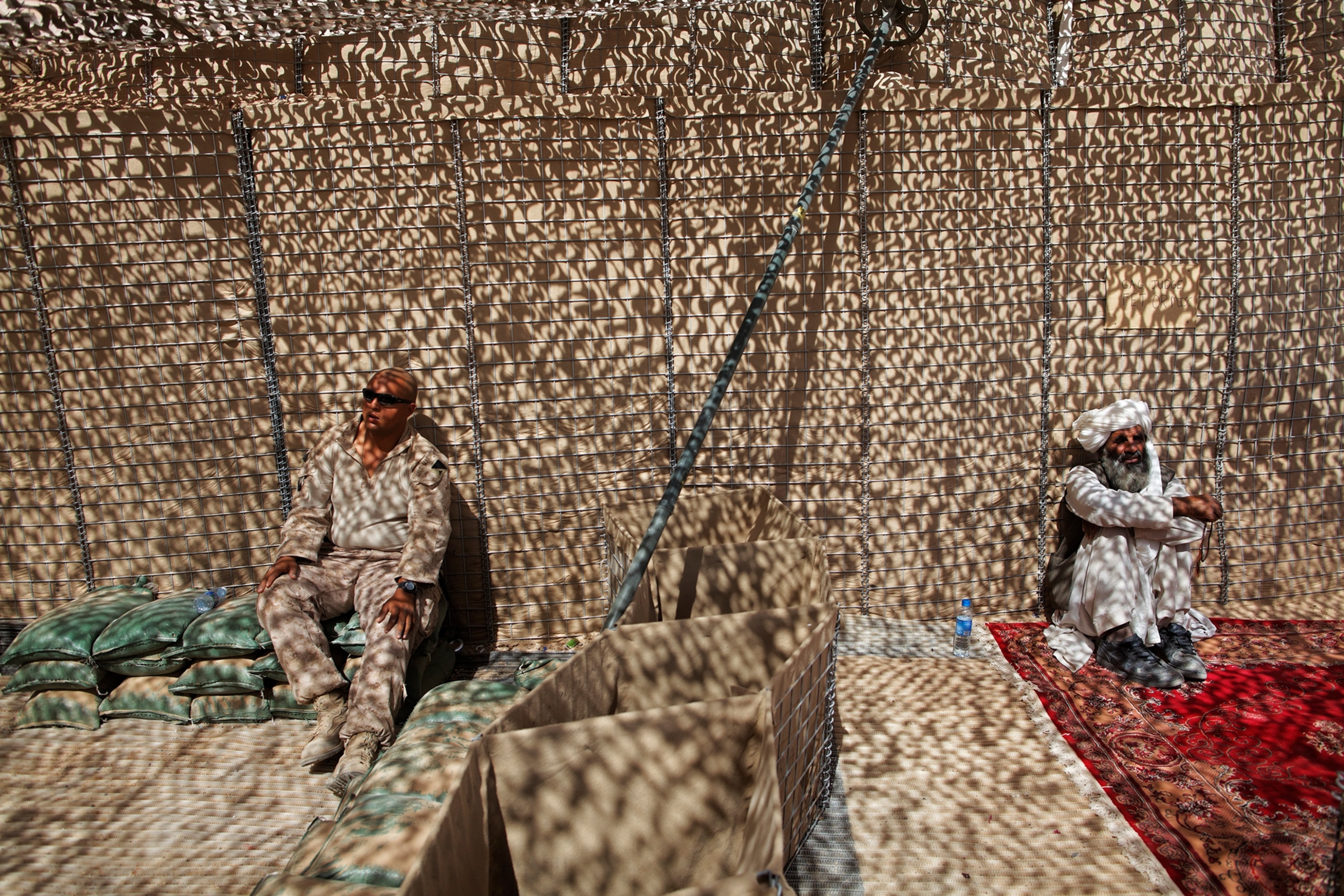Opium Wars
A key step to securing peace will be to wean Afghan farmers off growing poppies.
The chief of police has a memorable way of demonstrating that he's not afraid of the drug smugglers. He holds up his right hand, revealing the absence of his middle finger. Four years ago, Brig. Gen. Aqa Noor Kintuz was hired as provincial chief of police in the northeastern Afghan province of Badakhshan and charged with destroying its plentiful poppy fields. "After I finished one of the first eradications," he says, "my vehicle was blown up by a remote-control bomb." He rolls up his right shirtsleeve. His forearm is badly mangled. In the years since, he has received innumerable death threats. Women and children of poppy farmers have hurled stones at his policemen. One of his eradication tractors was torched.
The grim axiom defining today's Afghanistan, 85 percent of whose citizens are farmers, is that its economy relies on two dueling revenue streams. One flows from Western aid, in the hopes that the country will renounce the Taliban. The other flows from opium trafficking supported by the Taliban, which use the proceeds to fund attacks on Western troops. Only recently has the Afghan government seemed to take stock of the obvious: For the outside world's largesse to continue, the national economy's addiction to opium must end. The poppy fields must be destroyed. But just as this devoutly Muslim nation did not become the world's leading opium supplier overnight, uprooting Afghanistan's poppy mind-set promises to be a complicated endeavor.
In Badakhshan, chief of police Kintuz appears to be making some headway against poppies. Five years ago the province was Afghanistan's second-biggest opium producer, after the Taliban-controlled province of Helmand. For a brief period after a Taliban ban on poppies in 2000, Badakhshan even took the lead in poppy cultivation, because the province was controlled by the Northern Alliance militias, rather than the Taliban. When Kintuz started his job in 2007, 9,000 acres were planted with poppies. Two years later fewer than 1,500 were.
Eradication efforts have forced poppy farmers into the margins of the countryside. Their fields are, by design, all but invisible. To find one, you must drive for hours on a crumbled and isolated mountainside road, accompanied by someone who knows the district and will if necessary explain your presence there. You must look far from the roadside, gazing over the rolling terra incognita of northern Afghanistan—studying its monochromatic creases for that rogue burst of color, simultaneously innocent and obscene, that finally screams out what it can only be: a field of poppies.
A farmer squats with his back to the flowers, weeding an adjacent field. He is a 37-year-old man with the distinct Mongolian features characteristic of the borderlands, and he wears a brown tunic, a turban, and a tentative smile. He introduces himself as Mohammed Khalid. He acknowledges that the poppy field is his.
"My father taught me how to grow poppies ten years ago," he says. "Until this year, I was able to produce 60 pounds of opium from my farmland." Crouching while his fingertips brush against the tilled soil, Khalid describes how the smugglers would advance him the money for his crop and how a half-dozen members of his family would join him in the fields to weed, thin, and finally harvest the inky opium paste from the poppy bulbs—a four-month season of tedium that he hardly begrudged, given the benefits. The bricks of opium that he wrapped in plastic and took to the market would pay for all the food his family needed. In addition, the farmer would use the seeds to make cooking oil and burn the stalks as firewood and for ash to make soap. "It provided everything," he says.
With the relentless eradication, Khalid has come up with a strategy. His most visible farmland, the area he is now weeding, will hereafter be used for wheat and melons. Only the sliver of land that is almost impossible to see from the road will remain the sanctum of his high-value crop. "From that small field," he says with a glance over his shoulder at the riotous profusion of violet and pink and white, "I'll get about two pounds of opium. Maybe $80."
Possessing only the barest sense that he has become the hinge on which Afghanistan's future and America's national security interests swing, Khalid frowns and says, "I have no idea why they're eradicating. I'm just a poor farmer, and all I have time to think about is how to feed my family."
One morning during harvest season, Chief Kintuz and his team conduct a poppy eradication in the Argo district of Badakhshan, just two days after nine members of his counter-narcotics force were killed by a roadside bomb in Darayem. At dawn the convoy sets out from the provincial capital of Feyzabad—driving past clusters of newish houses built in the days before eradication brought such construction to a halt. Thanks to Chief Kintuz's efforts, this undulating countryside no longer features endless vistas of poppies.
The nine-mile road to Argo is a splintered mess—deterioration has left it worse now than it had been before a U.S. subcontractor was paid $2.5 million to resurface it. Rolling through the district center, past dozens of shuttered shops where opium was once sold openly, the convoy is greeted with hard stares from the villagers. A few miles beyond Argo, near the village of Barlas, the 30 or so armed counter-narcotics officers dismount their vehicles. The men set out on foot into the hills, searching for sequestered poppies.
The fields are everywhere: dozens upon dozens of crazy-colored tracts, none larger than an acre. The officers descend on them with bamboo canes and swing away at the flowers, reaper-like. The chief bashes away as well. A surveyor from the United Nations Office on Drugs and Crime (UNODC) faithfully records each obliterated site on his clipboard. A young farmer watches the havoc while crouching in his field. "That land belongs to my neighbor Israyel," he says. "I think he knew they were coming and didn't want to be around to see it. The police warned us last year not to plant poppy. So I've switched to melon. But all of this is rain-fed land, so if there's a drought, I've got a real problem."
I ask if he or his neighbors have received any of the millions of dollars being poured into Badakhshan Province by the U.S. Agency for International Development (USAID) and other Western organizations in an attempt to lure Afghan farmers away from poppies. "They promised the Argo district's governor that they'd give us bags of wheat seed and fertilizer," he replies. "But they haven't." The remark is similar to one by an elder of the nearby Tashkan district: "The government said, 'We'll build roads, bridges, and canals, and you'll forget poppies forever.' That was five years ago. They've done nothing."
In fairness, several things have been done—a newly paved highway from Feyzabad to Kabul, road construction projects in Tashkan, a saffron farm in Baharak, and 18 new district police offices. But for every worthy project scattered throughout this vast northern province is a village like Sar Ab in Yamgan district, where the lack of a medical clinic led residents to use opium as their only medicine until half of the 1,800 villagers became addicts. Or the village of Du Ghalat, in Argo, where a hundred children huddle like cattle on the dirt floor of a collapsing schoolhouse built with opium money that has dried up as poppy eradication proceeds. Or the millions of U.S. taxpayer dollars earmarked to fund agricultural projects in Badakhshan, which, according to one counter-narcotics official, "never got here—it disappeared."
The team advances to another field, and from a crumbling house a woman emerges, shrieking, "For God's sake, don't destroy it! We don't have anything else!" The men say nothing and keep swinging. A few minutes later, they discover another poppy field, surrounded by brick walls. Two small children stand against the wall, crying loudly as the officers approach. An older sister tries to comfort them as their mother hollers, "These children have no father! How will I provide for them now?"
The chief looks stricken. Lowering his cane, he walks up to the older girl, murmurs a few sympathetic words and presses a few Afghan dollars into her hand.
"Give his money back!" the mother hisses.
The officers move on to another widow's poppy field. She sits on a mule sobbing while they undo the labor of her dead husband—who she says had been a mujahideen against the Soviets and more recently fought the Taliban as a member of the Afghan National Army before being killed by a roadside bomb this past winter. As we proceed, I notice that the poppy bulbs in some of the razed fields bear telltale slash marks, indicating that their opium resin had been harvested before our arrival. I also notice fields that are plainly visible but go untouched. Are these oversights? Or has someone been bribed?
As the chief and his officers repose under trees after an elaborate picnic lunch of goat, chicken, yogurt, and fresh vegetables filched from nearby fields, I ask the chief if some of his own men may be involved in the opium trafficking.
"Yes, there are a few," he says quietly. "But let's talk about this later." When I remind him of his words the next week, the chief says he has purged his department of crooked cops. He says he does not know of any elected officials in Badakhshan involved in smuggling—"otherwise, I would have arrested them." I do not tell him that other sources have fingered a prominent official as a smuggler, as well as another smuggler who was a candidate for the parliament, offering to pay for votes and telling farmers that if elected he would ensure that opium production will continue. Even as Badakhshan becomes poppy free, local commanders and government officials have allegedly reached power-sharing agreements over drug routes taking opium across the northern border into Central Asia. The Afghan economy, even here in the non-Taliban controlled areas of the north, remains reliant on the drug trade.
In Feyzabad I interview a man believed to be one of the province's biggest drug smugglers. He will not confirm he is associated with the opium trade. But he tells me matter-of-factly, "Someone who just smuggles on his own isn't going to succeed. He has to have relationships with someone—like the district or provincial police chief."
For centuries, opium wafted over Afghanistan before engulfing it altogether. Though Alexander the Great could not totally conquer this rugged northeastern flank of the Persian Empire in the fourth century B.C., he is credited with leaving behind the drug that ultimately would. Actual cultivation of poppy shows up in Afghanistan's recorded history about 300 years ago. It was a crop well suited to the loamy soils of Badakhshan and the eastern province of Nangarhar, where it was first grown—requiring little fertilization and rainfall, a short growing season, and about as much expertise as it takes to hand-scatter seeds and cut slits in a bulb. Poppy occupied a benign niche in the country's agrarian culture throughout the 18th and 19th centuries, even as India's stranglehold over the opium trade later gave way to Turkey and then to the highlands of Southeast Asia, thanks to the growing market for heroin in Europe and the United States.
Only in the middle of the 20th century did Afghanistan become an opium exporter. At the request of the United Nations, which Afghanistan joined in 1946, King Mohammad Zahir Shah temporarily halted cultivation. The subsistence poppy farmers of Badakhshan and Nangarhar persuaded him to reverse his decision. In the meantime the crops for which Afghan farmers achieved renown were pistachios, almonds, pomegranates, cotton, and grapes.
So it was, until the Soviet invasion of December 1979 upended Afghanistan's landscape. The new occupiers closed off the markets for several of the country's fruits and shut down the cotton gins so as to benefit Uzbekistan's exports. The ensuing decade-long war between the Soviets and the U.S.-backed mujahideen claimed farm-to-market roads, irrigation canals, silos, and food processing factories among its victims. Afghanistan's agriculture was ruined. Between the U.S.S.R.'s withdrawal in 1989 and the Taliban's emergence in 1994, the country descended into chaos as warlords competed for power. Afghan farmers, struggling to regain their standing in the marketplace, discovered that India and Pakistan had developed their own products and were no longer interested in importing Afghanistan's. Those countries had succeeded in cracking down on their own opium production—and drug smugglers began to eye new pockets of instability where illegal trafficking could thrive. Operatives from Pakistan showed up in Nangarhar, then Badakhshan, then the southern province of Helmand. As agricultural consultant Jonathan Greenham describes his work in Pakistan to eradicate its opium production, "We just pushed the problem across the border."
These are among the reasons Afghanistan's share of worldwide opium production skyrocketed from 19 percent in 1986 to 90 percent two decades later. The greatest factor, however, was the Taliban. When it first came to power in 1996, the new Islamist government garnered support from tribal leaders by agreeing not to crack down on poppy cultivation. The supreme leader, Mullah Omar, received regular funding from trafficking groups, which he allowed to operate freely. At the same time, the new Afghan government levied a 10 percent tax on all agricultural profits. By 1999 Afghan opium production spiked to more than 5,000 tons, prompting pressure from the UNODC for a crackdown.
In July 2000 Mullah Omar issued a fatwa, or religious decree, declaring opium production a violation of Islam. The Taliban enforced the ban with brutal efficiency, as one former poppy farmer told me, "by threatening to set your house on fire." The result was a massive 91 percent reduction in poppy growing in one year.
After the U.S.-led invasion of Afghanistan and the fall of the Taliban in 2001, regional warlords once again cranked up opium production. No longer in power, the Taliban now saw opium as a way to fund their insurgency. "They saw the opportunity to generate a tremendous amount of income without sacrificing the subsistence of the people," says Wes Harris of the United States Department of Agriculture. Poppy is a winter crop, so after the harvest in late spring, a farmer can plant corn, cotton, or beans in the same soil. During years when demand is high, a farmer might make as much as six times more from opium than he would from another crop. When the price of opium is low, the farmer can simply wrap his durable product in plastic and store it until the market is more lucrative. It is now believed that the Taliban had a large stockpile of opium when they enforced their ban in 2000 and were deliberately curtailing supply to drive up prices.
As the Taliban have gained control of southern Afghanistan over the past several years, growing poppies has only gotten easier. Drug traffickers advance farmers money for the harvest and later arrive to pick up the product. The drug mafia sees to it that the routes to heroin processing labs in the borderlands and then out of Afghanistan are well cleared and the appropriate individuals bought off—since, as one veteran Afghan law enforcement official puts it, "Afghanistan is controlled by the drug mafia. How else do you think those people in the government with their low-paying salaries bought their fancy houses in Dubai and the U.S. in the past few years?"
NATO estimates that insurgents get half of their financing from drugs, nearly half a billion dollars. But with Afghanistan's opium economy totaling up to four billion dollars a year, the Taliban command only a fraction of that enormous sum.
A conundrum still looms for the poppy farmer: Opium is haram, or forbidden by Islam, as the Taliban decreed when they temporarily halted its cultivation. Or is it? Some Afghan mullahs postulate it is haram only to use opium, not to produce it. Other mullahs cite the Koran's proviso that a starving man may eat haram meat in order to survive. But the religious director of Badakhshan Province, Maulawi Abdul Wali Arshad, says, "We have a law in Islam: Whenever something is illegal, it is illegal from beginning to end. If poppy cultivation is legal, then how do we control opium smuggling? Or opium use? What the Taliban are doing isn't Islamic. The Taliban's involvement with the drug mafia shows that they don't want a truly Islamic government. They just want power."
Helmand Province is the Taliban's stronghold and ground zero for Afghanistan's poppy cultivation. It is the place where Americans, in a massive development project after World War II, built an irrigation system that still functions—but only because Afghan farmers have fashioned canals to bypass the clogged main arteries. They direct water to this or that farm simply by pushing aside a pile of mud with a hoe. As one USAID irrigation specialist said as we watched water gush from a canal across a brutally arid landscape, "Amazing, isn't it, to see this when we're basically in the 13th century?"
There is ample agricultural ingenuity to be harnessed here. In Marjah, where the International Security Assistance Force (ISAF) arrived in February 2010, first to uproot the Taliban and then to win the hearts and minds of the locals, the U.S. marines who surveyed Marjah's poppy fields gazed in wonderment at the desert lands ablaze in Wizard of Oz Technicolor. Many of the young men were from farming communities and could not help but admire the acumen of their Helmand counterparts. Wes Harris is impressed by how the farmers manage to grow soybeans and cotton side by side and to cascade grapevines down desert berms—"using every square centimeter to some end," he says.
Given that Marjah's Helmand Province is the source of 54 percent of Afghanistan's opium, the subtext of last year's campaign was clear to all. Far less clear is whether it's working. Operating under the belief that previous forced eradications in Helmand only alienated the farmers and flung them into the sympathetic bosom of the Taliban, the Marines announced last spring that they would pay farmers to eradicate their own crops—$300 per destroyed acre. A substantial number flatly refused to participate. Many of those who did sign on failed to meet the seven-day deadline for the eradication. In a good-faith gesture, the deadline was extended—giving some farmers enough time to first harvest the opium, then collect their check from ISAF. ("Did they turn the poppies over in mid-stride and sneak some past us? Probably so," one military source conceded.) But luck was on the Marines' side: 2010 was a bad growing season for Helmand's poppy farmers, with frost, drought, disease, and insects cutting yields by half.
At Camp Hanson, the Marine regiment's station in Marjah, 200 tons of fertilizer and seed packs sit heaped beside the trucks that just delivered them. One of the trucks has a shattered windshield, and four of the men who drove the convoy here from Helmand's capital, Lashkar Gah, are now in the hospital, having been shot in a Taliban ambush. The seeds—black mung beans, red radishes, alfalfa, watermelon, corn—will be sold to a thousand farmers in the area in the hope that they will quit growing poppies.
The commanding officer in Marjah is a tenaciously upbeat young man named Brian Christmas who sounds like Santa Claus when he rattles off the things he would love to see America do for Afghanistan's farmers. "There should be more seed programs available to them next year, at low cost. There have to be alternatives here. Like factories. Why not have a chicken coop, so that they can sell their eggs here in Marjah? Instead of just providing cotton, why not make Marjah yarn? A drug factory that employs 30 guys—I'd like to compete with that and say to those guys, 'Let's send you to a vocational tech school. Get you a small business loan. Set you up in a mechanics shop. Or hey, how about going into the police force? Pretty good salary, go home every night—not a bad gig!'"
The next day, dozens of farmers show up to claim their latest inducement. Simply setting foot on the Marine base is a risk that many of the area's farmers have decided not to take. The Taliban have set up checkpoints and relieved passersby of their new commodities. One boy is said to have been made to eat his ISAF-issued registration card. A tribal elder found to be assisting the Marines was "beaten to an amazing shade of green," according to a military interpreter. For most, the Taliban are the devil they know—and, more to the point, the devil who will likely still be here long after the ISAF troops are gone.
"These guys are playing both ends against the middle and seeing who's winning," says John Hurrell of Rift Valley Agriculture, the nongovernmental organization (NGO) coordinating the seed and fertilizer distribution. "Whatever pays the best is what they'll grow. Personally, I think they'll sell the fertilizer and seed and go back to growing poppies." One of the farmers I encounter filing out of the Marine compound with a bag of seed is equivocal. "It depends on what the local government does after the military leaves," he tells me. "If they leave us alone, then I'll grow poppy."
Will the Afghan authorities continue to press for a poppy-free future once the troops have left Helmand? "The minute poppy starts to pop up, there's got to be an immediate reaction—that's all there is to it," says Lieutenant Colonel Christmas. "The Afghan government has gotta be all over that—using local police. Things will get 100 percent better if they have a police force made up of their own people, ones they can trust." Alas, Christmas could recruit only ten locals to join the Marjah police—unsurprising, considering that the Taliban have threatened and in some cases killed civil servants in Helmand.
"We have two forms of money here: poppy, and American dollars," says a beardless 33-year-old Helmand farmer named Rehmatou as he leaves the Marine base with his fertilizer. "This is our economy. The Taliban aren't pressuring me—that's just a story you see on TV. I grow for myself. I smuggle for myself. The Taliban are not the reason. Poverty is the reason. And they'll keep growing poppies here—unless they're forced not to. Force is the solution for everything. As we say in Pashtu, 'Power can flatten mountains.'
"Who will stop the smugglers—the police?" he asks with a laugh. "It's the police who transport our opium in their cars! You see the big buildings in Lashkar Gah and Kandahar. This is money from corruption." Rehmatou betrays no love for the Taliban—"They're jackals"—but the system they have imposed works for him. Still, his bemused cynicism fades when I ask, "Is a poppy economy really all that bad for Afghanistan?"
"This is a bad way to make money," Rehmatou says gravely. "It trains you for no other occupation. When a father feeds a boy with money from poppies, he will grow poppies too. He'll have no other skill. We have no carpenters, no engineers, no mechanics. We have nothing."
With a sad smile, the farmer says, "It is a kind of cancer on our country."
Is it possible for the cancer to be removed? Bordering Pakistan to the east, Nangarhar Province has long been a drug smuggling thoroughfare, and its mountainous reaches—which include the Khyber Pass and the Tora Bora cave complex—are notoriously lawless. With its Mediterranean climate, Nangarhar was Afghanistan's biggest opium producer as recently as 2004. Forced eradications began in 2005, but the government's promises of alternative livelihoods were not met initially, and even the provincial capital of Jalalabad remained underdeveloped and quiet.
Today the city and its environs appear to be a post-poppy success story. The fertile countryside, long regarded as Afghanistan's breadbasket, is alight with red cabbages and tomatoes. Jalalabad's streets are now among the most vibrant in Afghanistan, and at its teeming wholesale market, hundreds of trucks arrive every morning, bearing dozens of crops such as watermelon, potatoes, squash, okra, and onions. None of these rival the cash value of opium, and one potato farmer I meet at the market tells me that he works an evening job as a security guard to make ends meet. "But I don't regret it—I'm glad not to be growing poppy anymore," he says.
In the village of Yaghi Band, which once grew poppies almost exclusively, a group of tribal elders reflect on Nangarhar's post-poppy era in a room overlooking fields of cotton, rice, broccoli, and other crops. "The life isn't as good as it was five years ago," one of them says. "But it's 60 percent of what we had. And we're hopeful of the new projects." Among these projects is one situated directly below us: a hydroelectrically powered textile mill, set up by a USAID affiliate. Contributions to the province from such programs seem endless. Among those I visit are new irrigation dams and canals, new bridges, a women's weaving co-op, a potato chip factory, a honey processing plant, a jam manufacturing facility, and the city's wholesale market, whose deputy director, Khwaja Mohammad, praises the contributions of NGOs but then adds, "Afghanistan is still at war. We can't stand on our own two feet. If a country's been at war for 30 years, it may take 80 years to rebuild it. If the farmers don't continue to receive assistance, you can't expect them not to grow poppy."
Eighty years of assistance? Is poppy-free Nangarhar a Potemkin village propped up by aid from the West? What might it cost to offer equivalent generosity to Badakhshan and Helmand, and would it make a difference? When I put these questions to Nasrullah Bakhtani, senior agriculturalist for Afghanistan's Ministry of Agriculture, he says, "Nangarhar has a tribal system. There's one big man in the village, and people accept what he says. The governor there talked to these elders. He asked, 'If we eradicate poppies, what will you need?' Proposals came from the people, and the government said, 'OK, we'll provide those if you stop growing.' As you see, Nangarhar has a lot of projects, people are happy, so they stopped. Helmand and Badakhshan don't have those kind of tribal structures."
Bakhtani once grew poppies himself. He stopped in 2002 when Afghanistan's new president, Hamid Karzai, declared that poppy cultivation should cease. As an agriculture specialist, Bakhtani was asked that year by the Karzai administration to help prepare a road map for a post-poppy Afghanistan. That paper, "Scientific Guidelines for Reduction of Poppy," advocated the introduction of alternative crops, expansion of irrigation systems, modernization of animal husbandry techniques, rehabilitation of the northern forests to diminish soil erosion, establishment of textile plants, federal subsidies for seed and fertilizer—in short, the entire laundry list now being implemented by the West.
But Bakhtani believes such programs must be community based, not some carrot-and-stick-and-more-carrots approach by outsiders. To circumnavigate the government's pervasive corruption, Bakhtani has in mind an elaborate set of checks and balances whereby a national ministry contracts an organization to start a new project in a particular community. The money for the project would be put in a bank account, and both the community and the ministry would monitor how the contractor spends it. Under this system, he envisions a network of badly needed irrigation canals and drought-resistant pistachio forests in Badakhshan. He imagines greenhouses in Helmand, so that the province can produce off-season tomatoes and other such crops that sell for high prices. This is the future as Nasrullah Bakhtani imagines it, brighter than a poppy field.
But, I gently ask: as long as the local governments are filled with corrupt officials bribed by those with a stake in Afghanistan remaining an opium haven, does his proposal stand a chance?
"The problem," he says, "is that the government is involved."
"And so to eradicate poppy, we would first have to eradicate corruption?" I ask.
"Yes. Yes."
"And so realistically, is there a chance the poppy can be eliminated as a major part of Afghanistan's economy?"
Bakhtani looks thoughtful for a moment. "No," he then says. "Not possible."
Grinning, he says, "Sometimes I think I should form my own company, get money from the government, go out into the field and do all of this myself. Go out and show people the way."
Then, with a weary shrug: "But people would just say I'm corrupt."

